#and utilized in very different ways than them so it was never really a Thing in the first place
Text
i don't really know how to articulate this super clearly but i really appreciate that like. kuon conceptually with the 8 floaty swords behind him could very easily have turned out like a murakumo knockoff and im impressed by how visually and stylistically distinct he is. its really nice
#crow.txt#uniposting#fgcposting#i guess#but like do you see what i mean do you see what im saying do you see the vision#the same could kinda be said for vati but her playstyle isnt remotely like the murakumos and 3d effects make her wings more distinct#and utilized in very different ways than them so it was never really a Thing in the first place#but i was expecting him to have a like. lambda 6c type move or something#however he does have one thats Literally just origins and i find that REALLY funny#also i kinda like how he has moves that look like shadow scare and spin! and bent sinister/black orbiter#bc that seems like. how to put it. poignant? since exs abilities that are red are such a Thing the color red in the hollow night is a Thing#and its interesting when theyve stated hydes and carmines are red like they are because theyre a purer form of EXS#(and not actually blood in carmines case specifically)#so the big bad rebirth man having pure exs red moves makes sense and its kinda fun that theyre like other ones weve seen but stronger#like yeah that tracks. thats a really nice touch#also his intro with his hood up is really fucking funny him and linne are siblings so true. emo bitches#i love seeing when the parallels are paralleling its fun. autism brain go brr
2 notes
·
View notes
Text
Dp x Dc or just Dp things I (personally) want to see more of.
Just some stuff I've seen and really liked but never see enough of.
Danny is very casually a genius and/or skilled (engineering, gymnastics, really any skill you pick):
There isn't enough of it tbh. I dont think people realise just how smart and skilled he is. Being a ghost probably made him very flexible and gave him extra abilities the average human may not have. Also he comes from a family of scientists, yeah maybe up against them he doesn't seem smart, but being "smart" comes in different forms. More often than not the ability to be smart comes from your ability to pick up on things, retain information, understand information, and use that information accordingly. Danny does that, especially with his villains. He even finds outside the box ways to defeat his villains. Like tricking Freakshow into becoming a ghost.
I just think its under utilized. A lot of Teen heros are geniuses but no one ecknowledges it. Hell, you can make it that Danny doesn't even realise just how smart he is. He doubts it and often thinks he's one of the dumber people in the room. But when sleep deprived and running on a cup of coffee he can solve a problem he hasn't even seen before the konk out for an hour.
Danny has BEEF with the JL or isn't outright a fan:
In a lot of fics the JL (especially Batman) are huge hypocrites. Like they'll barge into Amity trying to solve problems that don't even effect them, screw things up more, then offer Danny more training. Hello????? You guys being there caused the problem???? Then, in other things Batman preaches about territory and Danny will get threatened or treated with suspicion for even stepping foot NEAR Gothem, but then barges into his territory like its his buisness.
Let Danny call them out. Let him point out that everything has been fine untill they showed up. Let him get MAD. This is HIS territory, HIS haunt, HIS people. These guys have done nothing for him! Why should he accept their help when their help only makes things worse? In fics where they help him because he needed it and ended up in Gotham let him be suspicious and careful. He doesn't need to be vivasected or hurt to be warry of the crime fighting furries he just met.
Mans has the experience to know you can't trust anyone untill they prove you can.
Danny should be casually overpowered and spooky:
This isn't even he has to be experienced. He is so used to his powers he doesn't realise how scary it is. He will casually stop a punch from superman, laugh, quipe, then punch back.
He accidentally breaks stuff, walks through things, glows, its so normal for him. He apologizes and does it again because he forgot. He genuinly has no idea how strong he is, he just knows he needs to be soft on humans.
Danny and Phantom are very different personalities:
I'm not saying they're two different people. They have the same mind same person. But the way they act is so different. Danny is grumpy, quiet, whimpy. Danny is a loser, and everyone knows it. Phantom, on the other hand, is confident, he jokes, smiles, makes a game out of his struggles, he's strong. Phantom is just a good guy. Everyone (minus others) loves him!
This happens because Danny is more comfortable as Phantom or Vise Versa. Sertant trates carry over, they're nerds, they're smart, they enjoy a good pun, they're sassy. But because Danny is a loser everyone sees it as lame, but with Phantom its endearing.
~~~~~~~~~~~~~~~~~~~~~~~
None of this means you need to get rid of silly nerdy Danny. You can have that but all these other things ad depth to his character. Hes smart but not confident, he's kind but not naive, he's powerful but not violent, and he finds comfort in the fact no one knows him.
Idk. I'm not a big fanfic writer so i thought i would just share and see what others do with it.
#dp x dc crossover#dp x dc prompt#dp x dc#dpxdc#dc x dp#dcxdp#danny phantom#batman#dc comics#writing#text post#funtime speaketh#just some of my thoughts#personal stuff no one has to actually follow#just putting it out there
410 notes
·
View notes
Text
adhd study tips.
by a stem student with adhd.
disclaimer!!! I’m by no means an expert in mental health or adhd but I do happen to have it. My intention with this post is to help others with adhd get more comfortable with studying so the process will be smoother for them!! At the end of the day, despite having the same disorder our brains will still work differently so do keep in mind that these may or may not help you, but are something you can try out if you’re stuck on not being able to study efficiently.
here’s some adhd study affirmations + tips on straying from discouragement if you’re experiencing burnout.
(And here’s part 2 of adhd study tips.)
I’ll start this off by listing more commonly known study tips that also work well with adhd.
change up your environment every now and then. we seek novelty even more than neurotypical people already do so switching it up will definitely help in our studies, especially if the place is well lit!
try some questions of the topic you’re trying to learn even when you know nothing about it. both neurotypical and neurodivergent brains are hardwired to remember things when we are proven wrong, and this is a great way of utilizing this neurological response!
take walks, exercise or stretch during your breaks. this tip is very effective at satiating our hyperactivity and also keeps us energized throughout our study session.
keep a notebook for your brain dump / ideas. we always either think of really stupid things or the most brilliant ideas in the middle of our study sessions and it almost always leads to distraction, but writing it down somewhere lets your brain know that the idea isn’t going anywhere and you can continue studying.
now, onto the tips that have personally helped with my adhd (and I haven’t seen many others talk about.)
alternate between various study plans, routines, schedules and techniques and always be open to finding more of them. majority of the time people always say ‘have a routine that works for you and stick with it’ but our adhd brains get bored very quickly, especially when it comes to repeated routines and schedules. I personally never stick to the same routine or plan more than three days in a row and sometimes I even make a plan on the spot and I’ve been more productive doing that than when I had only one or two study routines to switch between.
do not time yourself at the very beginning. Instead, focus on something in your studies you’re interested in and start there. what do I mean by this? well, since starting is always the hardest, when we begin our very first pomodoro we might find ourselves spending the first 25 minutes zoning out on a textbook just to get that ‘study time’ in even though you didn’t actually learn or recall anything. So to combat this, begin with something you’re genuinely curious about, or ask a question you can’t help but wonder the answer to. Once you find the answer, you might find you’re more in the zone and can continue from there. If not, take a short break and begin the pomodoros afterwards.
if you’re zoning out while reading up on a topic, try walking around while reading, looking at different sources on it or do some questions on that topic. again, novelty always gets us every time. sometimes the problem may be that the explanation in front of you isn’t making sense in your head and other sources may phrase things in a way that is better for your understanding. perhaps the problem is that you’re staying too still and you need to satisfy the hyperactive part of your adhd. or maybe your brain subconsciously believes that they already know what needs to be known about this topic, and there’s no better way to test that by trying out some questions on it.
switch between lyrical and non-lyrical music playlists, but make sure the lyrical music inspires you to excel. this definitely won’t apply to a lot of people but I found that when I constantly listened to piano, lo-fi or just non-lyrical music while studying in general, it actually promoted my likelihood of zoning out. but recently I found a playlist I deeply resonated with that was related to my studies called, ‘pov : a try-hard mid student who wants to ace everything’ and because I related very deeply with both the title and the lyrics of the songs, I was actively being encouraged to study as I was studying. but I also recognize when I really need to think in certain areas and that’s when I switch back to the non-lyrical music.
this is all I have as of right now but please do lmk if you guys want more of these!! I really wanna help out as much people as possible because my studies suffered greatly due to both my adhd and my late diagnosis of it and I’d love to help out others going through something similar.
#stem#science#study tips#study#study hard#studyblr#studyinspo#study motivation#studystudystudy#studygram#study guide#study gram#adhd problems#adhd#actually adhd#adhd stuff#adhd things#adhd tips#living with adhd#adhd study tips#adhd student#adhd struggles
1K notes
·
View notes
Note
Hiii I’m so sorry to bother you!, hope your day goes well <3 I just want to ask, how can I improve in maths? I’m preparing myself for the sat and I have trouble with understanding it. Any tips would be very much appreciated, thanku !! ♡
Become a Math Whiz: Acing Math Class & the SAT 📈✏️📚👩🏫
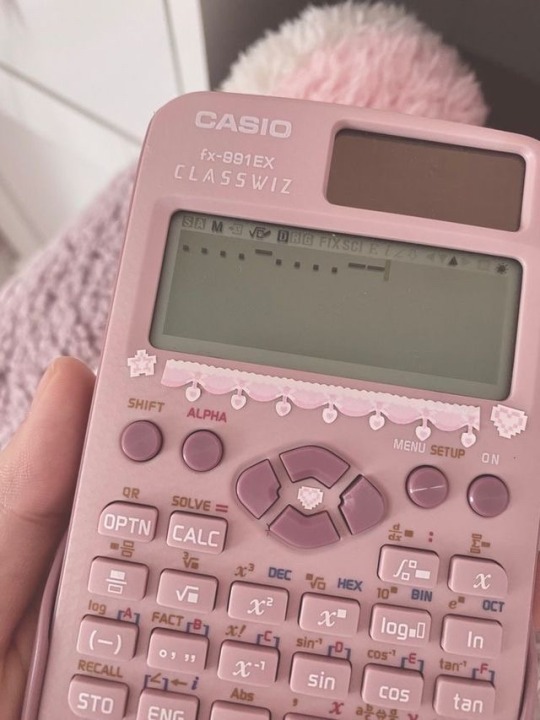
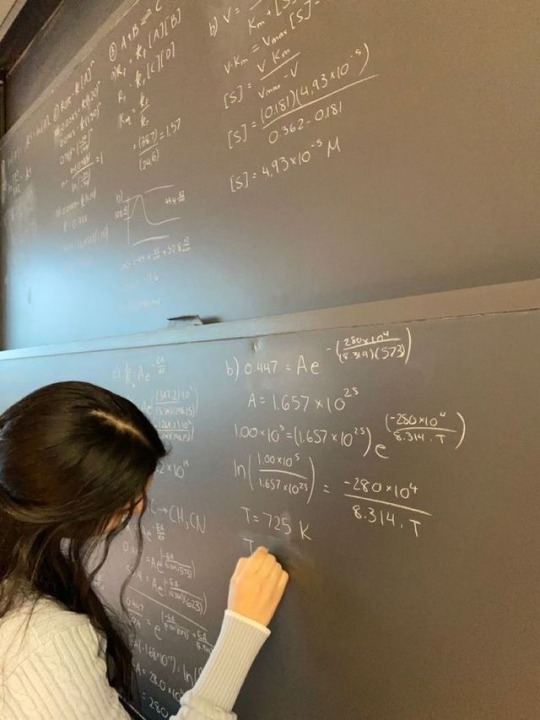
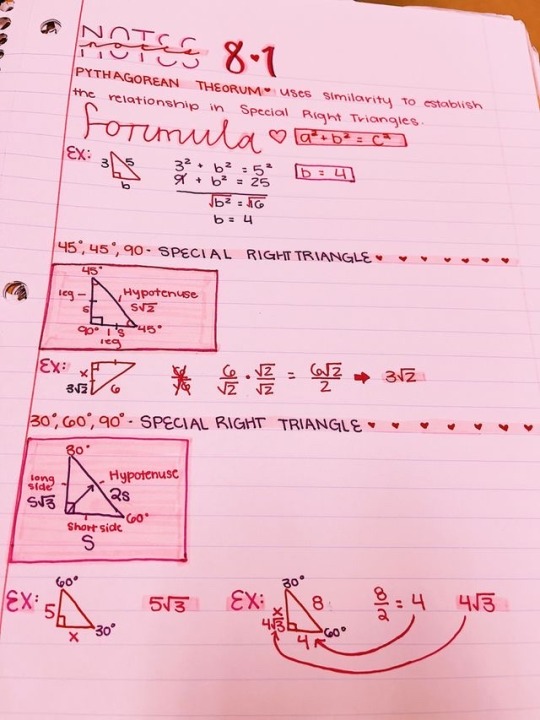
ty for the ask & the kind words! you are never a bother, i'm happy to help 🥰 i can def give some tips as someone who went from struggling w/ math to being good at it. and i’ve taken the SAT so i know that experience as well! i hope this helps 💗
take accountability
it’s very easy to try to shift blame & avoid taking responsibility for your grades/ performance. i used to think things like “the teacher is just bad!” or “i’m just not a math person!” but this mindset is just deflecting. some things are out of your control, like what teacher you have or preferring other subjects, but you have to step up & work hard to create your own success! remembering this will help you stay motivated and disciplined.
find your learning style
i talked about this in a previous post too, but there are different styles of learning - visual, auditory, hands-on, & reading/writing - and not all of them work for everyone. if you spend a ton of time studying and don’t see improvement or results, that’s a big sign that you’re studying wrong. a method that works for your friend or that your teacher uses might not actually be effective for you. so do some research into learning styles and study methods, and find implement strategies that work for you.
never fall behind
okay, easier said than done. but one of the biggest reasons i used to struggle is math is that i would get stuck on a concept, never fully master it, and then i’d stay behind. in math, a lot of topics build on each other. if you get stuck on a topic, it’s crucial that you figure it out asap or your confusion will snowball. you can’t build a solid structure on top of a wobbly foundation. the moment you encounter a problem area, study it until you’ve completely understood.
practice makes perfect
i try to steer clear of recommending specific study methods b/c everyone has different learning styles. but math is so dependent on problem solving & applications that you really have to master this skill in order to succeed. beyond just reviewing your notes & reading over concepts, you need to practice applying topics by solving problems. do the homework questions & do them for accuracy, even if it’s just graded for completion. find extra problems in the textbook, workbook, online, etc. redo questions from class or the hw that confused you until you can do them correctly without your notes. drill it until you can solve them AND understand how the steps work!
ask for help
i am clearly a big proponent of asking for help. in school, your teachers are gonna be one of the best resources you have. for one, they’re teachers for a reason, so even if you think they’re not too great at explaining stuff, they know the concepts. and besides that, your teachers the ones who are creating units, assigning your work, writing & grading your tests... they should be your go-to for questions. visit them during office hours or email to set up a meeting where you can discuss concepts. ask for extra practice problems, ask them to look over your work & let you know how it looks, talk through your work with them. aside from teachers, you can get help from a tutor, a classmate, whoever you can turn to. but pls don’t suffer alone! succeeding with help is still succeeding.
use the internet
so maybe your teacher truly sucks at explaining. maybe you don’t have classmates to help and can’t afford a tutor. or maybe you just wanna supplement your learning another way. i really really recommend utilizing free learning tools online!! khan academy is an obvious one for videos, practice problems, and more. you can also find tons of youtube videos explaining math topics. sometimes it helps to hear things explained another way. i also google “[math concept] practice problems” if i want extra questions to work through.
bonus: tips for SAT math
the SAT is a bit different b/c the math concepts aren’t actually too advanced. it’s all multiple choice so you don’t get to rely on partial points for showing your work. the SAT is testing your strategy & speed as much as it’s actually testing you on math concepts, so here are my best tips for that specifically:
use khan academy’s SAT prep tool - it’s free (!!!!!) and it links to your collegeboard account. it uses prior years’ SAT content so it’s very similar to the test itself. it helps you pace yourself, pinpoint your problem areas, learn & apply concepts, & track your progress. here's a screenshot from when i used it, as you can see my scores improved and i was able to ultimately get a superscore of 1450!
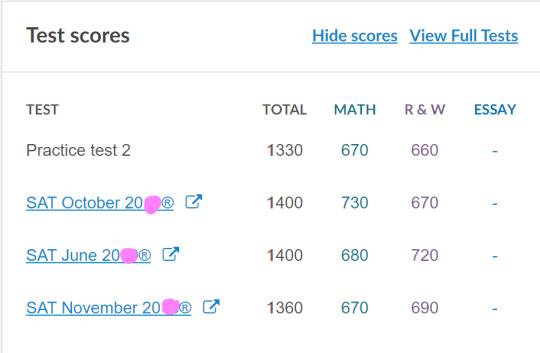
take practice tests - this helps you get familiar with the time constraint. khan academy has plenty!!
do a ton of SAT math practice questions - ideally, find a ton of questions used in prior SAT tests and just crank them out. the test's concepts are quite repetitive so if you just focus on the topics they usually test, you can master them
learn test-taking strategies - the SAT is multiple choice and has a tricky time constraint, so however you can save time will help. become good at using the process of elimination & other multiple choice test methods. you can find these sorts of tips online!
i hope this helps! know that you are completely capable of improving at math. i went from thinking i suck at it & doing poorly in math class to acing my calc courses & studying to enter a math-focused field. utilize your resources and figure out your best study style asap, and you WILL see improvements!
#pink academia princess#it girl#becoming that girl#that girl#wonyoungism#pink academia#pink blog#girl blogger#studyblr#studyspo#study motivation#glow up#motivation#self care#self improvement#dream girl#academia barbie#girlblogging#pink pilates girl#clean girl#self love#pink pilates princess#pink aesthetic#study blog#study aesthetic#university#student life#study tips#study tumblr#study techniques
409 notes
·
View notes
Note
Slowly making my way through the TOTK B roll stream, had a few thoughts on the emptiness of the sky islands. In a way, would it not be more surprising if there were more remains to be seen? Ignoring the whole 'it's a game, decisions were made by the developers' bit, nature can take over surprisingly quickly in the right circumstances. In a way, it's more surprising so much survived in BOTW (like the bomb hut ruins. Fire damaged wood? Should be gone in a decade or two anyway). (contd)
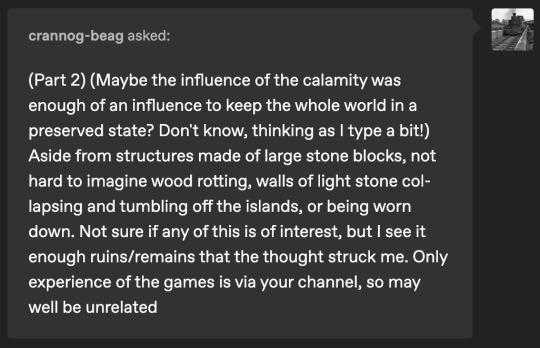
So the thing about the Sky Islands in Tears of the Kingdom is that, not only are the ruins fairly well-preserved - presumably due to having been in the Sacred Realm for the last 10,000+ years - but even with them damaged and tumbledown, it's fairly clear from the layout of the islands and their structures that they were not residences. That's not something that would've been lost to erosion and time, that's something foundational to the architecture of the place.
When the game designers want to show a place people live on the surface of Hyrule, they hit a few key points: distinct-looking homes with beds, places that make food, and an inn for travelers. The buildings are different sizes, decorated or personalized by the residents. They're laid out relative to one another in a way that allows for easy, convenient traversal. It's intentional design that makes the villages feel lived-in, cozy, and worth protecting.

Inside the buildings, little details show the presence of living people, even if the building is empty at the time. Table settings, notebooks, pictures on the walls. They feel like they've been shaped by the influence of people, living and working and customizing their environment.
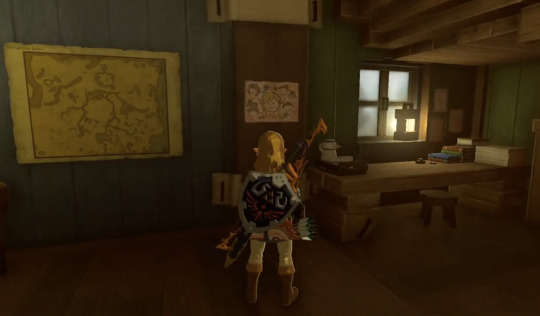
These are all, to be fair, things that we wouldn't expect to last very long if the town fell to ruin. When we explore the sky islands, we aren't expecting to find well-preserved paper maps or notebooks or anything. But if they were lived-in - if they were Zonai population centers rather than temples, ritual centers and factories - that would still be reflected in the basic layout of the structure itself. A residence is designed to accommodate for every basic need, meaning we'd expect the buildings to have places for them to sleep, to eat, and to relax. On the Sky Islands, we find none of these things.
The most common buildings on the sky islands are these isolated stone one-room ruins. They look and feel like storehouses - a few pots, some crumbled masonry. No doors or interior rooms for privacy, no comforts, no sign of a place to sleep, no adjoining buildings. These things were never homes.
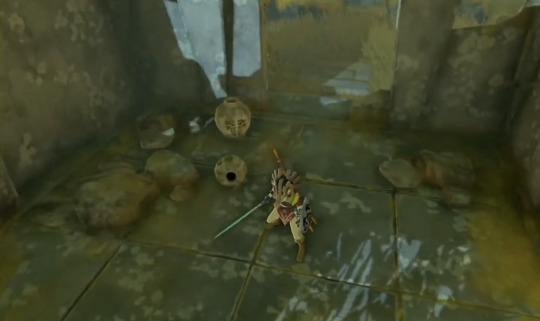
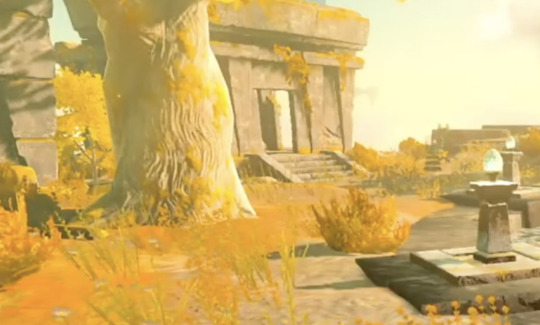
The Great Sky Island is the only really plausible candidate for a place the Zonai might've actually lived, being about town-sized with several buildings, but it's not laid out like one. The buildings are either small one-room storage sheds or the massive Temple of Time, and there's no sign of other specialized buildings that could have been used for things like food, rest or other necessities. The Great Sky Island feels like a large, beautiful public park built grafted onto the Temple of Time.
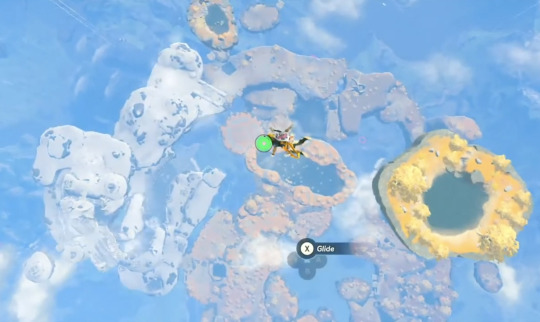
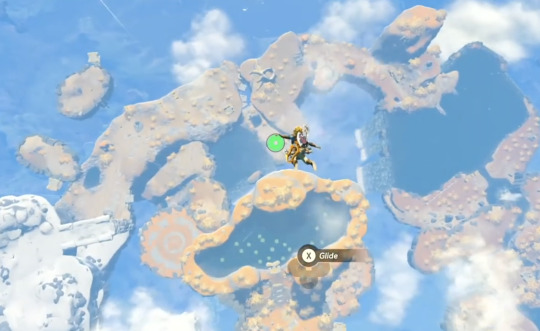
The larger dungeons are more internally complicated, but not in the way that residences are complicated. The water dungeon looks like some kind of huge open park - wide avenues, plazas, devices built for mobility. It feels like a place meant to be traversed and admired, not stayed in.
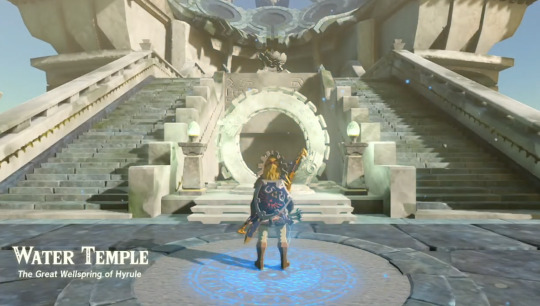

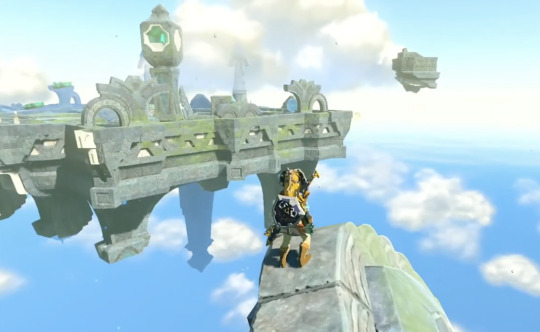
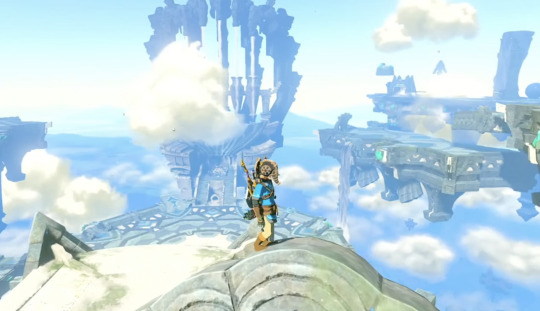
The wind dungeon is more clearly built as a weapon platform, nowhere we expect people to live. It makes sense that it feels sterile and lifeless.
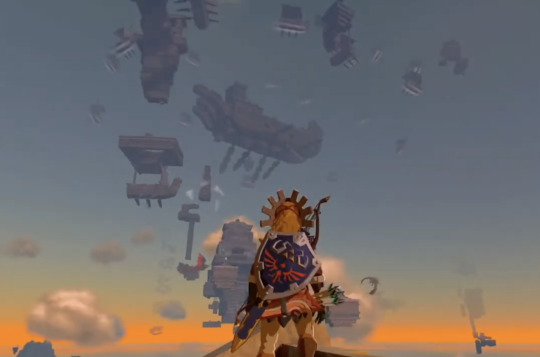
The larger, more complicated sky islands are also designed for clear utility. The spheres are some sort of celestial observatories, featuring a control system, a treasure chest, and nothing else.
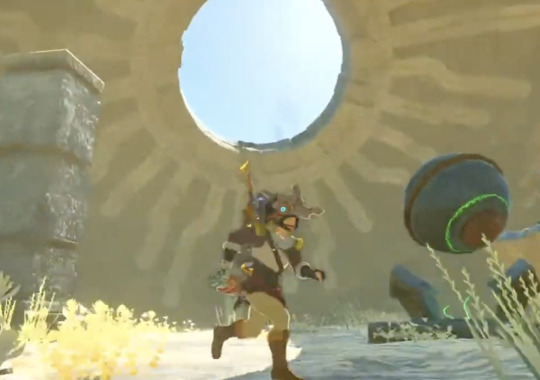
Wildcards like Lightcast Island were clearly built to serve a single purpose - in this case, a lighthouse and attached microdungeon - but contain no signs of life. Zonai came here for a reason, but they didn't stay.
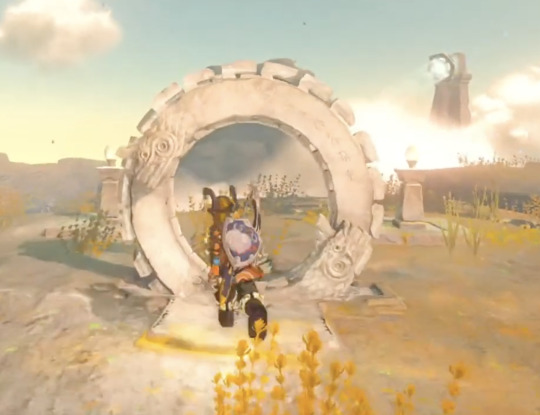
The glide challenge islands are visually impressive, but ultimately the rings are empty - they don't even have structures on them. They exist for the dive challenge and nothing else.
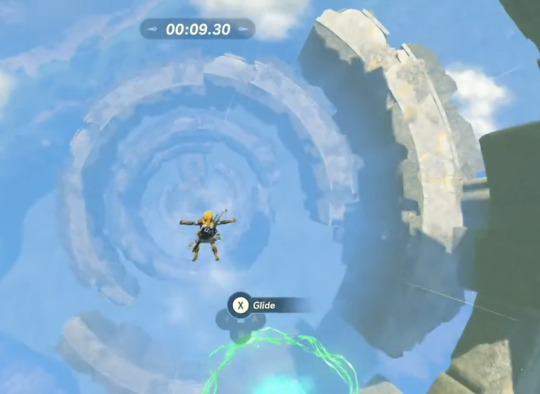
Same deal with the labyrinths, which exist explicitly as puzzles and challenges.
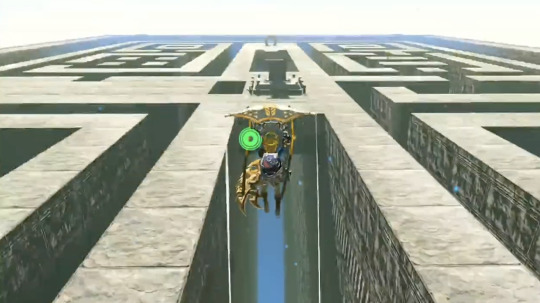
The mines in the depths are also clearly structured for utility - storerooms, construct part repositories and a lot of conveyer belts for moving zoanite. The purpose of the building is very clear just from the layout, and these are not places where anyone was supposed to be staying outside of work hours.
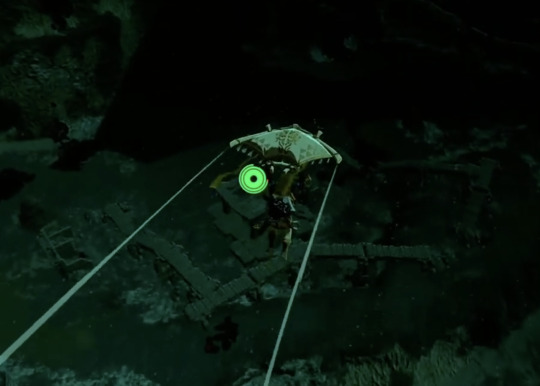
This, along with the layout of towns on the surface, shows that the designers are very good at constructing architecture that reflects the in-story utility of a place, which means the lack of signs of life in the sky islands is not a limitation of the console or the imagination of the artists - it's an intentional design choice.
The end result of all of this? The Sky Islands feel like somewhere that the Zonai built and visited, but not where they lived. They feel cold and unwelcoming and liminal. There's no sense of loss or tragedy, just a feeling of emptiness - people used to come here, but they don't anymore. There's none of the poignancy of an empty dining table's unused place settings or an abandoned child's toy. None of the Sky Islands that descended during the Upheaval were places where the Zonai lived. At the peak of their power they were mistaken for gods, a massively thriving technologically advanced civilization - I'd expect their homes to be cities, towers of jade and marble bustling with the activity of a post-scarcity utopia. None of the Sky Islands show us anything like that, and given how well the designers can portray a lived-in place even without any people in it, this is assuredly intentional. The Zonai built and visited and used the Sky Islands we can explore, but as a whole they lived somewhere else.
But throughout it all, there's this pervading unease - the fact that there's no obvious tragedy makes the sky islands feel more unnerving. We know just enough of the story to infer that something happened to the Zonai - something bad, if we read into Rauru and Mineru's reaction - but whatever it was left no scars. The Zonai constructs don't even realize anything's amiss. The buildings have been damaged only by time and gravity; the forges and mines and observatories and temples are silent and abandoned, like the Zonai all went home one night for dinner and just never came back.
The Sky Islands don't feel dead, they feel lifeless. A place people passed through but didn't leave their mark on. When Link traverses the islands, he isn't just alone - he doesn't even have the comfort of signs of life. The only evidence he has that anyone ever came to these islands are the fact that somebody built them in the first place. They left no marks, no art, no notes, no diaries, no toys, no graffiti. They're just gone.
379 notes
·
View notes
Text
Why Is Druid?
Say that like ‘where is Wizard Hut?‘
I love the 4e Druid. This is a marked change from how much I liked the 3e druid, or how often you might see me playing a druid in a Baldur’s Gate game. Back in 3rd edition, the druid, despite being very powerful, never really engaged me, in part perhaps because I was always trying to find something exploitative and powerful rather than merely accepting the juggernaut of a toolkit the game just left in the Player’s Handbook. You couldn’t get clever with the Druid, you just had to pick it up and use it, like some sort of society of creative anachronisms where one of the anachronisms available to the players was has gun. Valid, but hardly sporting.
The Druid in 4th edition is different. Wildly different. Weirdly different, and different in one of those ways that shows what I think of as a seam in the design between 4th and 3rd editions of D&D.
The Druid was one of 3rd edition’s great mistakes, a full spellcasting class with healer capacity to serve as a pinch-hitter healer in a group that wanted things a little more varied, addressing an enormously complex potential build from its earlier edition, 2e, and all in the process, resulting in some deeply confused mash up of abilities that attempted to address confusion with volume. The druid of 2e had a special unique set of rules compared to the Cleric — for example, at a certain level, you passed into a specific category of Druidic ability and now you were technically a Hierophant, and Hierophants had seven extra spells of every level. Of course there was a limited supply of Hierophants in the world, so there was a question of if you could level up if another one existed, and maybe there’s a one-in, one-out policy? First in, first fired?
Anyway, I can’t speak to how it played, but I am at least aware, on the edges of it, that the 2e druid was odd. It had a lot of things it could do, but much of how it worked, reading the books, seemed to be interesting but challenging to manage. You could wild shape, you could heal, you could cast utility spells, you could even fight with some melee weapons — personally, I didn’t see any of it worth it, because none of the things it could do it could do very well.
3e addressed this seeming difficulty by instead taking all those different options and bringing them all up to the same level. Wild Shape worked by checking traits of monster units, which meant that you weren’t limited to specific reinterpretations of animals and instead could do what a druid feels like it should do — you know, turn into an animal. The spells were rebalanced and shared across different classes, which meant that they tended to work in a more standardised way. Armour rules were aggregated, and weapons were made less terrible.
The result was that the 3e druid went from being ‘decent’ at a bunch of things to ‘good’ at everything it wanted to do. The problem of the druid then became about picking the thing you wanted to at every opportunity, and doing a good job of it — you’d have druids carrying wands of healing so they could dedicate their spell slots to more important tasks, like Flame Striking opponents, or messing up the battlefield with roots. You’d also see druids keeping the ‘best’ list of animals on hand, and every new monster book presented a new chance for druids to develop a new best form.
It also created the strange question of What does the druid do?
The answer was ‘everything.’
The 4e Druid, in comparison and contrast to these designs is something very different that touches, at best, on the periphery of what the 3e Druid could be. I mean it stands to reason, you can only ever touch on doing everything when something you’re working from is so powerful. 4e with its role system of Defender, Striker, Leader and Controller, and its reliable, reusable balance math suddenly was confronted with fitting an elephant into a shoebox.
How do you represent something busted that could do everything in the context of a new system that sought to explicitly prevent that? I joked when the game was new that the four roles were Defender, Striker, Leader and Miscellaneous. That any class too powerful, with too much stuff it could potentially do, got thrown to the Controller role as suggested by the first Controller we ever saw being the Wizard. Oh and back in Player’s Handbook 1, the Wizard had a few builds that were pretty ridiculously pushed — the pinball wizard, I’ll talk about it sometime — and that meant that it was easy to feel like the Controller Does Everything.
That impression diluted through experience, of course, and eventually it came to that while yes, the Controller sure has some Miscellaneous vibes, the core of what the Controller was there to do was to attack the enemy action economy. Nice and obvious to a non giga-nerd, right? Okay, how about this: The leader lets you do more things, the controller stops them from doing more things?
And into this space, they poured the druid.
It works beautifully, for my tastes; the druid needs to do lots of things to feel properly druidy, but you need to make sure the doing lots of things doesn’t unbalance the game. Controllers have the widest variety of things they can do and ways they can do them – inflicting status conditions, changing enemy position, preventing specific action types, making areas on the battlefield inaccessible, these are all ‘controllery’ things, and that means there’s a lot of different ways you can flavour them. The Invoker is most famous for making zones in the play space hard to deal with, the Wizard has a build that slides things all over the place, and the psion controls people with immense penalties to their damage rolls.
Obligatory pause where, while reading this aloud, for either Fox or I to comment on how amazing it is that Dishearten is an AOE power.
Anyway, the druid was designed to be a mode switcher class. That is, there are two ways a druid can do things. One is a melee controller that makes a single target’s life harder, the other is a ranged controller that makes a large group of enemies’ lives harder. This mode switching then adds a new element to the class that your powers can interact with, where you now have control powers that can add a mode switching element to them as well. This is your Wild Shape – you transform into some kind of nonspecific beast, which can use your Wild Shape powers. Each form has fewer powers to manage, and you can build your druid to specialise in one or the other or do a mix.
This lets the druid do the ‘a lot’ without letting them actually do everything. You have a lot of choices and a lot of ways to play with those pieces, but even just how often you use the mode switch is part of what the druid does to control the battlefield. When I first played a druid, it was not uncommon to start a fight out of wild shape, use the first turn to make some kind of area control power, then shift into wild shape for the rest of the fight kicking people into that area control power. There are druids builds that work like wizards and only ever shapeshift to get away from problems, and make a hit while scuttling away, or to sit on a specific type of problem. There were druids who focused on summoning monsters and using them as kind of turrets on the battlefield, positioning allies in a way that benefitted them around those summons.
Lone artillery combat encounters, where you have a bunch of stuff in front of a long-ranged attacker? Druids love those. Even at level 1, that artillery is spending their days completely stuck underneath a Fire Hawk power.
Problem is, of course, that if you want to do Everything doing a Lot is going to miss something. That was what led to the subclasses of the druid, the ones that added healer elements to the druid, because the druid back in 3e could do that. It added animal companions, because the druid back in 3e could do that. Now I don’t worry too much about these things because if I wanted an animal companion on my Druid, I’d take a theme for that, but also because these changes were introduced in an Essentials book.
Which is to say, they’re crap.
They’re not crap crap, like I try to defend Essentials as giving players a choice for simplified character builds, but in the specific case of the Essentials Druids, in order to work with the simplified choices, these Essentials druids with their animal companions and their healing powers have to look at all other Druid powers and not use them. The only use they get out of their animal companion is using the specific subset of powers that make them work, and that makes combat more samey. But again: That’s a thing you probably want if you want a simplified build.
Still, it gives rise to my favourite joke – I mean like, funny thing, not really a joke, there’s no subversion of reality or anything here – about the Healer Druid. See, every Leader in the game gets an encounter power, usable twice a combat at level 1, that heals an ally with a bonus. Every class gets their own version that lets them distinguish their class specifically and add some interesting detail that shows how this Leader differs from other Leaders.
The Healer druid build gets Healing Word.
The Cleric power.
Literally, the same power, same name, listed as a Cleric power.
Check it out on PRESS.exe to see it with images and links!
91 notes
·
View notes
Text
Another Update
Hello Friends,
I have a rather long (but optimistic!) update to share with you all today. As many of you are probably tired of reading these kind of posts, I have a TL;DR here, but I did want to share what has been on my mind in that past half-year that I haven't been here.
It has been rough, and busy as always, but I think I'm finally facing myself and my project for the first time in a very long time.
TL;DR (it's actually long, I have a lot to say (*_ _)人)
I soul-searched and decided to stop compromising on my own feelings with regards to this project. I gave in to everything I wanted to do.
Plot changes, which means some character changes, which means some of the demo is outdated.
GotRM will be switching over to Twine.
----
OH MAN DID I SUFFER THE LAST FEW MONTHS
After my previous update, I hunkered down and really analyzed how I wanted to proceed with GotRM as a project. Because even prior to that post, I had already been going through long periods of hiatuses (which you are all aware of), and while I didn't lie about school taking up my time, I was also harboring a growing dissatisfaction with my own writing that really killed my progress for a long time.
So after everything had settled, I sat down and forced myself to peel apart my work. I know I said I would answer asks, but I uninstalled all of my social media and put aside this blog to focus. I made a note of all the things I liked and didn't like, and I made a list of things I wanted to change or improve on. The biggest point was that I also looked at my efficiency during actual writing sessions: how much of my time was spent writing vs. fighting with code? How could I change that?
And after a lot of deliberation, I figured there were a few things I had to change from the ground up, summed up in four points:
My working style was super incompatible with grad school. I can't spend 20-30 minutes scrolling up and down CSIDE checking code or looking for narratives while also jumping between chapters to make sure events line up. As this story grows, the more difficult it becomes to keep track of all the branches, so I needed an alternative working method, which I am adhering to now, and it prioritizes efficiency.
I hated the way I was tracking and coding stats in-game. I have griped so much about coding stats, and I have adhered to such a rigid style that I really felt trapped whenever I was confronted with balancing them out. So I'm throwing that to the wind and redoing how I utilize and convey them. Player-side, this decision doesn't change much since I never fully utilized stats in the demo anyway, and the stats page with indicators will still exist, but I'm getting rid of stat bars and how I treat stat checks.
The story I want to write now is different from the one I started out with. I've known for a while that GotRM was becoming far more than the tiny, wishful novella that I wrote as a teenager. I held onto that old story for a long time, but there's just so much I want to change that I realized I'd been clinging to a story I no longer enjoyed writing. So I spent the majority of the last few months rewriting GotRM from scratch. I redid some worldbuilding, I changed a lot of plot points, and I fixed a lot of characters' backstories accordingly. This meant scrapping stuff from even the demo, but that turned out to not be the biggest issue because:
I wanted to branch away from ChoiceScript. Honestly, I never really cared about getting officially published, but the camaraderie in the forums and on Tumblr were why I committed to CS and CoG. However, ultimately, I really want the functionality that other tools can offer GotRM, and so after a long internal debate, I will be switching over to Twine. Fortunately, since I was rewriting everything anyways, this has been relatively painless, and passage mapping has made everything so much neater. I am trying my best to make it up to chapter 2 before I release the new demo, so please look forwards to that!
And so yes, I am still here, chugging along.
I love this game and this story: it's been my creative escape for as long as I could remember, and you can imagine how frustrated I was when I realized I was starting to dread working on it.
I am forever learning more about myself and my writing style, and this is simply more of that journey. Thank you everyone for sticking around, for joining the discord, and for checking up on me--that I have all of you has truly been a dream.
Hopefully more updates to come soon! I understand that there may be questions about these new changes, so please ask away! I will (try) to release some asks that I've been working on in the drafts too, but I will wait until at least tomorrow to release them so that this post doesn't get drowned out immediately.
And as always, with a lot of love,
FriendlyBowlofSoup (Mei)
259 notes
·
View notes
Note
(If you're alrght with another poorly articulated question from an obnoxious high schooler) Do you have thoughts on academics and their position in a labor framework? I know some grad students and have never been quite sure where they fit because they don't always work with "capital" in a traditional sense. Professors are odd to me because they are under university contract, but rather than get paid by the university they often get their own funding from the government. Or graduate sudents, who are often unionized, but I know a paleontology student who studies shark fossils who says he doesnt really consider what he does "making surplus value."
ok well that last person is simply confused lol. graduate students exist because the university profits from having us; it is a capitalist institution. most directly we usually work as teaching assistants or research assistants (or else pay tuition) and more indirectly, graduate programs get funding and university support because their existence contributes to a university's rankings, prestige factor, &c, which is to say its (perceived) profitability. plenty of us study things that don't produce much directly lucrative research, but this does not mean the university keeps us around for shits and giggles or some kind of laudatory interest in knowledge for its own sake. it is a capitalist institution and acts in the financial interest of its owners / beneficiaries.
anyway wrt faculty members, they are also employed by the university because it profits from them (or hopes to, anyway). i think many people get confused by tenureship; tenure is indeed fairly cushy as far as employment contracts go, but it is is still an employment contract, and most faculty are not actually tenured anyway. academics are a classic example of the 'professional-managerial class', which is not a marxian term but is a useful one for identifying those 'upper-middle class' members differentiated by their professional qualifications and status; the prestige and perceived utility of academic knowledge production is partially what makes academics an attractive target for a lot of government and NGO funding. state funding of academic research ofc has numerous functions but, and not to put too fine a point on it, a capitalist state also invests money in things because it is hoping for some kind of return on investment, eg in the form of directly profitable inventions, soft power, &c.
there are distinctions here between different academic employment statuses. an adjunct or contingent hire is paid by the university solely to teach, making their labourer status fairly straightforward. with tenured or tenure-track positions, yes there may also be money coming from outside; however, this doesn't negate the fact that the university is trying to profit from its faculty (else it wouldn't hire them). the professional-managerial class has certain characteristics of both proletariat and bourgeoisie, and there is some variation between academics as a very select few do attain the kind of household name status that can turn them into basically a personal brand. again though: the university wants to extract value from the work (both teaching and research) of academics it hires, and so do outside sources of funding for research projects. knowledge production should not be mystified or abstracted in ways that obfuscate the financial interests of involved parties; though it attains a prestige that few other commodities do, this is still a process that is embedded within the overall operating logics of capitalism.
an additional consideration wrt internal academic class politics is that many faculty use graduate students, postdocs, and even undergrads to perform or assist with their research. these arrangements vary in structure (and between disciplines) but in general, this does mean that many academics produce papers, books, &c that depend upon the labour of many people and rarely compensate these people equally to themselves. this can take the form of a more overtly employer-employee relationship between a professor and their underlings (for example, some labs are run this way) or it can be the case that it's another party (a publisher, say) who is reaping most of the surplus value squeezed from grad / undergrad / postdoc labour. in any case it is important to keep in mind that professors can and often do take on employer (ie, small capitalist) roles in relation to other employees of the university, even though the professors themselves are there because the university and other institutions pay them and profit from their labour.
i hope this is a useful start; obviously there is lots else to be said about the economics of the university and knowledge production as a capitalist process. in general when you are trying to think through this my advice would be not to let the presentation of the university as some kind of cerebral place of enlightenment confuse a materialist analysis of the flows of capital. plenty of workers and capitalists deal with commodities that are immaterial in the sense that 'knowledge' is, or are imbued with similar social meaning and value; the university deals with knowledge production but this does not make it any less an employer (ie, a capitalist institution) than any other institution operating in a capitalist context.
#unionisation is another thing rly---university union politics are kind of atrocious generally lmfao#v rare to find solidarity between academics---even grad students---and other employees of the university like support staff or athletes#ofc many grad students consider themselves not employees but temporarily embarassed PMC. so#academia
132 notes
·
View notes
Note
I hope you don’t mind me sending in asks every so often, because I really love your blog and I like reading your opinions/analyses of ATLA’s story and characters. What I want to talk about is this one trope in fiction that I’ve always liked and wanted to see more of, which is “Person A sees characteristics of Person B’s personality or abilities that are kind of morally dubious or complicated and possibly less than desirable (depends on what the ability or personality trait is) and even though Person B has complicated feelings about what they saw, they never flinch or look away from who Person A is.” Because I’m obsessing over Zutara again, this made me think of the scene where Zuko sees Katara bloodbend for the first time and while he is momentarily surprised, his facial expression goes back to normal quickly. Something similar happens when he sees her waterbend while confronting Yon Rha. I really wish we had gotten a scene where Zuko and Katara actually talk about her blood bending abilities, though the main reason I wanted this isn’t only because of the potential for another Zutara moment. I also really wish the narrative had utilized bloodbending more and that we had gotten to see more of Katara’s complicated, ambiguous feelings about bloodbending (and yes I know she didn’t like bloodbending in canon, but I wish we got to see her be a bit curious about it or not knowing how to feel about it before she decided that). What are your thoughts about this? Is there anything about Katara’s bloodbending that you wanted to see explored in the narrative as well?
First of all, I love getting your asks! They are always very well thought out and insightful! I think you sent me another one that I didn't get a chance to respond to yet because I have been very busy, but I'm not tired of getting asks from you at all!
And I do think an underrated aspect of Zuko witnessing Katara bloodbend is that it's validating to him as an abuse survivor, as a fellow child of war who also lost his mother, as someone who deals with anger issues, to see Katara bloodbend and be able to control her bloodbendinng in that moment.
I do not think that Zuko was intentionally living his revenge fantasies through Katara or encouraging her to commit violence. We've actually seen both Jet and Hama try to do that to Katara and there are some distinct differences. If you recall the way Jet and Hama talk about their actions, and the way they try to get Katara to also do those things, they appeal to her with specific language. They appeal to her anger, specifically, telling her to think about what happened to her mother. They take joy in assuming that she is just like them and has sunk to their level.
When Zuko talks with Katara about Kya, he does not focus on her anger and loss and the need for revenge. Instead, he tells her that Kya was brave. When he sees himself in Katara, he doesn't see negative. He sees someone who is angry, yes, but also someone who isn't controlled by that anger.
Part of the problem with the way antis talk about this episode and Zuko or Katara specifically is this pathologizing around whatever "fantasy" they think Zuko or Katara might be engaging in. And let's be real for a second. It is actually incredibly common for abused children to have revenge fantasies about their abusers. Like, incredibly common. But it's something that is not talked about very often because we don't like to think about it. When it is talked about, it is usually in terms of the person becoming violent themselves.
I do think that Zuko wanted for Katara the same thing he got with his father, the chance to confront him and to walk away, to not be goaded into violence or sink to that level. But that doesn't mean it isn't also incredibly validating for Zuko to not only watch Katara have power over this man, but to be able to exert enough control over that power to be able to walk away.
Which is similar to what Zuko does with his father. Zuko doesn't want to be angry anymore, but that doesn't mean he suddenly becomes a doormat. And when he faced his father, he was prepared to fight if he had to. He brought his swords, he redirected lightning right at Ozai's feet. He made it clear that he could have hurt Ozai if he had wanted to. But he has enough control over that anger not to. Directionless anger is ultimately similar to intrusive thoughts of revenge, because both make the person feel helpless and out of control.
Also my piping hot take is that Aang was afraid of Katara's anger because he himself never learned to control the Avatar state, whoops.
Anyway, I love that Zuko has that moment when he maybe sees a bit of his old self, the part of himself that was angry and wanted to hurt people because he was hurt, in Katara, and it surprises him. But now he's wise enough to have compassion for himself, and for her by extension, and understands now that that anger comes from grief.
91 notes
·
View notes
Text
BG3 Companion Headcanons: Wicked Grace (Or, Well, Talis¹)
I got to thinking about what it would look like if we had a similar scene with the BG3 companions as the infamous Wicked Grace scene from Dragon Age: Inquisition. Enjoy:

Lae'zel: She doesn't really see the point of a game seemingly so dependent on chance rather than true strategy – she and Gale share a bonding moment over this – and refuses to participate after losing by an embarrassing margin in the first game. However, she does take a "strategic vantage point" from which to keenly observe the proceedings, and makes a private vow to win back her honor in future, after the sting of defeat has eased.
Astarion: He's the one who suggested the whole affair in the first place, but he quickly finds himself with cause to regret it. On the one hand, he ends up... enjoying himself to a certain degree, but on the other, he does not come out of it with anything near the unquestioned victory he expected. He's not used to playing against opponents with a comparable skill level, so his attempts to cheat his way to victory only succeed a fraction of the time. His stress levels increase after Lae'zel taps out and takes up haunting the table, and the inconsistency with which she calls out his cheating is worse for his nerves than if she did it every time.
Shadowheart: Astarion may have suggested the affair in the first place, but she's the one who manipulated him into it, by "casually" noting on a mission one day that it was a shame none of them had a deck to play with, as she was a great enjoyer of the game even though she had never had any great skill with it. In fact, such games were highly emphasized among Sharrans for their unparalleled utility in information gathering, manipulation, and subterfuge.
Gale: He starts out very certain of his skill and assured victory, then begins making several pointed comments about how it would be a different story if they were to bring out the lanceboard when he begins losing ground — and articles of clothing. He makes a decent showing for himself, but folds out just after the midpoint of the evening to join Lae'zel in treating the remaining players as the prime entertainment they are.
Wyll: He played with some of the Fist recruits as a teenager, but he's a little out of practice. He gets fleeced for the first few rounds, but settles into it, keeps his wits about him, and quietly gets his own back by the later rounds. He regularly catches his opponents off-guard with an unexpected quip, and Karlach has to excuse herself for an entire round after snorting ale out of her nose in a horrid mix of foul steam and boiling liquid. He apologizes vigorously, but can't stop laughing along with the rest of them, and it certainly doesn't make him stop.
Karlach: She's actually a brutal opponent, but unfortunately stymied by her recent experience being with the rulesets used by those devils willing to play in Avernus, and, prior to that, the heavily amended rules favored by the seedier neighborhoods of Baldur's Gate. No one – particularly not those currently winning – is willing to switch to a different set of rules in the middle of the evening, but Karlach makes them promise that next time, she gets to pick the ruleset. She calls it a night after the Ale Incident, clapping Wyll on the back before flopping down next to Gale and Lae'zel, and picking a new target to cheer on each round. (Her cheering is distracting enough that said targets are typically grateful when her attention lands on anyone else. This is on purpose. She is having a grand time.)
Minthara: She treats the initial invite with icy disdain, noting that she has far more productive things to do than to engage in such puerile pursuits. The camp is small enough that she can't entirely avoid the bright cluster of gathered individuals raucously ribbing at and laughing with each other. She ends up drifting nearer, noting that in Menzoberranzan they played for much more meaningful stakes than mere coin. Everyone's in a good enough mood to leave that one alone, and so she somehow ends up standing just behind Halsin's shoulder. She offers blunt and often biting commentary berating his strategy for being too hands-off, falling silent only when he wins that round — albeit with a gambit that would have lost him some fingers in Menzoberranzan. He looks at her with a gleam in his eye, but doesn't press his point, merely tilting his hand to allow her a better view, and they proceed to form a fairly successful team.
Halsin: He plays up his ignorance at first, claiming cards to be "an invention of civilization", but acquits himself with the skill of a reasonably accomplished dabbler. As the night wears on, he admits in a quiet, humor-laced aside that his master, the previous First Druid, was an inveterate card sharp, and Halsin's own skill was merely what he acquired in self-defense. When Minthara joins him, he ignores her more bloodthirsty suggestions, but incorporate those that suit his own strategy, culminating in an unpredictable, yet startlingly effective strategy.
Jaheira: She's brutal. A terror. They overlook her the first round – innocent, unknowing fools that they are – more focused on their own petty squabbles with one another. She smiles calmly, refuses to rise to any of the general ribbing, then sweeps the entire pot at the last minute with a play that leaves them all gaping at her. From that point, they are gunning for her in particular — and she makes them fight for every single copper they regain.
Minsc: No one is certain whether he knows what game they're playing. He will make absolutely absurd plays, then come in at the last with a card laid out on Boo's direction that somehow turns it around. His chaotic playstyle means he's never first — but he's also, inexplicably, never last.

¹ "Some games of skill are detailed below, but games of chance are also popular. Wagering on any sort of game is also a favorite pastime.... Talis Deck: A deck of seventy-eight cards, typically made of lacquered paper or parchment, in a wooden case. The deck is similar to a tarot deck." Forgotten Realms Campaign Setting 3E. 2001. p. 96.
#voidling speaks#headcanon#meta#my meta#bg3#halsin#minthara#wyll ravenguard#shadowheart#karlach#jaheira#minsc#astarion#gale dekarios#lae'zel
90 notes
·
View notes
Note
There is exactly one criticism that I agree with my, very anti-Jedi, cousin on and that's the Jedi were TERRIBLE Generals. Generals may TRY to make sure their men mostly come back. But useless sacrifices are not only acceptable, but expected, the men are mostly expandable in war. The Jedi did not consider sacrifices like that acceptable or expected. Sure it did happen. It was WAR. But they tried their best to make sure it DIDN'T. The Jedi were terrible Generals. But they were the teachers and Leaders the CLONES NEEDED.
I'm not sure I'd ENTIRELY agree with that. I think I'd be willing to agree that the Jedi were perhaps less CONVENTIONAL Generals, and they definitely do seem to at least TRY to place the lives of their men above just tossing them away for an easy victory, but you can just as easily claim that keeping the men alive to keep fighting is a good strategy in and of itself.
The biggest piece of evidence I'd point to that the Jedi were actually perfectly good Generals is the Citadel arc and Tarkin's criticisms. The one real criticism he makes of the Jedi as military leaders is that they're occasionally too soft and will abandon a mission if it looks impossible to win without near total casualties (on either side). But he's generally fairly positive about the Jedi and if they were truly awful at their jobs, I don't think TARKIN of all people would hold back on saying so, even to the Jedi's faces.
And we DO see the Jedi willing to make sacrifices and accepting that this is a necessary part of war. The Citadel arc is, again, a perfectly good example of this. Obi-Wan and Anakin go in with like 3-4 men each I think and they come back with a grand total of 3 (Rex, Cody, and Fives). A LOT of clones die on this mission that they all KNEW was basically a suicide mission because the Jedi themselves decided that getting the information about the hyperspace lanes was vital enough to the war that it was worth losing multiple lives over (including their own).
So it's not that the Jedi don't understand that sacrifices are necessary in war or even that they avoid it entirely, they just avoid what they see as UNNECESSARY sacrifice for what might amount to a fairly minor victory. Keeping more of their men alive might, in the long run, be a better strategic choice than losing all of them on one campaign, especially if it's over like one uninhabited moon or something like that. There's nothing to say that the losses the Jedi deem acceptable are things that would've changed the entire tide of the war had they chosen to push forward instead.
The other good evidence that the Jedi acting this way would've been the WORSE choice is the Umbara arc. We are told and then see that Krell IS the kind of General who is willing to lose a lot of clones in order to gain victories in battle, and the clones do recognize that he has a lot of victories under his belt. But never once do they discuss whether those victories really MEANT anything or had a large impact on the war effort. It certainly never seems that the Republic is majorly pushing back the Separatists because of Krell's victories, nobody ever mentions that Krell gained them a major advantage with those victories or took out anyone of any consequence on the Separatist side with his strategies. And by the time he gets to Umbara, he's explicitly using this strategy to WEAKEN the Republic side and cause a loss. Several of his strategies WOULD'VE meant the Republic lost on Umbara and it's only the clones utilizing different strategies that put fewer of them at risk that they actually end up continuing to HAVE victories at all.
I'll also point out that the Jedi continuously getting their men killed en masse would've bankrupted the Republic a LOT earlier because they'd have to be paying for more clones a LOT more often than they did in canon and I can't imagine anyone would've considered that a particularly sound strategy and at some point I'm sure the Senate would've felt obligated to put a stop to it anyway and insisted on strategies that kept more clones alive for longer. So I'm not sure it's fair to claim the Jedi were utilizing BAD strategy by not just exclusively using tactics that meant most of their men were killed for every single victory.
So the ONLY criticism we EVER see of the Jedi's ability as military leaders is Tarkin claiming they're "too soft" and Tarkin is the kind of person who would likely say that until the Jedi started carpet bombing entire Separatist planets. Would it give them a victory? Yeah, sure, maybe, but that's the exact same strategy the Separatists are using and look how well that works out for THEM. Everything else we ever see seems to showcase that the Jedi are in fact perfectly good Generals, not just in that they're kind to the clones and are unwilling to carpet bomb Separatist planets, but also because they're just... good at this. They CAN be strategic, they CAN run wars if they want to. And I think that's the whole point of the Jedi in some ways is that yes, they CAN make war when they need to, they just actively choose NOT TO every time they can. THIS is why Qui-Gon tells Padme that he and Obi-Wan are there to protect her but that they can't win this war for her and they end up going off to fight off a Sith while Padme has to actually win the war with her own people and the Gungans instead. The Jedi don't WANT to be in the position of doing nothing but fighting, but they're absolutely capable of this kind of work.
That's the tragedy of the war in some ways, the Jedi ARE good at this no matter how much they wish they weren't sometimes. But being good at it means they can actually protect the Republic, their own men, and even the Separatist civilians better, so they're not going to just sit there and do things that will screw over a bunch of people. Yes, they're going to fight the war in such a way that they reduce casualties as much as possible, but reducing casualties also requires doing enough to not LOSE the damn war, too. It's a delicate balance they're trying to hold on to and I'd argue they manage it better than anybody else would've ever done in their position.
#star wars#jedi#pro jedi#clones#clone troopers#the clone wars#listen i am not a strategist#i CERTAINLY am not a military strategist#but just looking at what we're shown and told by tcw and the films i think it's fairly the clear the jedi were GOOD at being generals#regardless of whether they LIKED that or not#yes they wanted to protect the clones but they weren't idiots and they clearly weren't causing the republic to lose all the time either#there's a difference between strategically retreating from battles that can only be won by massive casualties with little to no reward#and prioritizing saving the clones OVER necessary victories in the war#the jedi are doing the former to my perspective#if they weren't i think the republic would've been a lot worse off just in general#unless we're about to start claiming that the clones and/or civilian officers were doing all of the real work instead of the jedi#which i personally would not#esp since we see the jedi sitting there going over battle plans and coming up with their own strategies quite often#tarkin's opinion on the matter is suspect - don't take his word for it when he says the jedi are too soft
99 notes
·
View notes
Text
As I've finally finished Ten's run...my thoughts on all of Ten's companions (in an order that makes sense to no one but me)
Martha:
I have...complicated feelings about Martha. I'm going to be honest, for her first few episodes, I did not like her all that much. Of course, the thing is, you're almost not supposed to like her at first. One of my favorite things about series 3 and 4 is that Rose very much haunts the narrative--you can feel her presence in Ten's thoughts, how her absence informs his decisions, almost as if she never left. Martha's role, at least in those first few episodes, is to make us miss Rose. She's a plot device. I don't think this is the case for the rest of the season, she has a lot of compelling things going for her character--her complicated relationship with her family and her desire to travel with Ten partially being due to her wanting to escape their chaos were really interesting. Also, her studying to be a doctor while traveling with the Doctor could have been a fascinating plot point if it had been utilized more often--but unfortunately, I think everything her character had going for it was too often muddied up by the "one-sided pining for Ten" plotline. I'm by no means opposed to the plotline in and of itself, I actually quite like it, but halfway through the season it started to get annoying to me. Like, I get it, him kissing her in episode 1 and then asking her to travel with him is really confusing, that's totally understandable, but after that long of traveling with the guy and him making it extremely clear that he doesn't like her like that...like, girl. Give it a rest.
(Not that Ten is entirely blameless in this situation--this man has never heard of a healthy coping mechanism. He just wanted Martha to travel with him because he was lonely, nothing else, but didn't make that clear at all. His refusal to even acknowledge her feelings, which he was perfectly aware of, and have a healthy conversation about it wasn't helping matters.)
I loved how they handled her exit in Series 3, however--I loved how Martha acknowledged that their relationship wasn't healthy for either of them, and that she needed to get out. (Ten staring as his shoes in that scene...gosh...)
And, with the one-sided pining plotline out of the way, I loved her appearances in Series 4! I loved how she actually got to be a doctor and do cool stuff! Also, I know her ending up with Mickey in the end is a very blatant Pair the Spares move, but have you considered: I do not care. I love them. They are so cute. (Didn't Martha have a fiancé in Series 4 though? What happened to him? Did he die or something and I missed it?)
Also, Martha is the most obvious example of what the Dalek's argue in the Series 4 finale--that the Doctor cannot help but make his companions into soldiers.
Donna:
Donna!!! I'll admit, I was pretty neutral about her in her first appearance--but I was so excited to have her back in Series 4. It was a breath of fresh air to have a companion who was very clearly a friend rather than another love interest, and her dynamic with Ten was so different than with any other companion. Their banter was so entertaining, and her lack of tact, though it got her into trouble sometimes, enabled her to say important things to Ten that Rose avoided saying for fear of jeopardizing their relationship, and Martha would have regulated to passive-aggressive muttering under her breath. (Thinking of "you talk all the time, but you never say anything" -esque conversations.) She cuts through Ten's bluster with relative ease, and it's fascinating to watch.
I also love that her traveling with the Doctor helps her grow as a person, flying in the face of Ten's belief that he destroys everything he touches--until the memory wipe, of course. Still, the Doctor Donna is still in there. (Also, was I supposed to think that the woman in white in The End of Time was Donna? That's what I assumed, but I'm not sure if I'm right.)
Rose:
Believe it or not, when I was thirteen years old and tried to watch Doctor Who for the first time, I did not like Rose Tyler. I thought that Rose was annoying, and that Nine was too angry and scary. (Thirteen year old me only got as far as The Doctor Dances, forgive her.)
I liked her much better the second go-round--I think the moment I was really sold on her character was her whole Bad Wolf moment, which makes sense. Her character growth throughout the series is by far my favorite, though I'm not sure I could tell you why. I'm going to try, though!
I think one thing that's pretty easy to forget about Rose is that she begins as quite a similar character to Donna, in that she doesn't have all that much going for her in her day-to-day life--she didn't do all that well in school, didn't go to university, is working at a department store (a job which she loses in the first episode), is living with her caring but rather foolish mother, and is dating a well-intentioned but pretty immature guy. It's a little startling at first glance how quickly she's totally on-board with traveling with the Doctor and being in so much danger all the time (even before she's in love with him), but it makes sense when you consider how little there is left for her at home. There's her mother, there's Mickey. That's it. And once she's seen the beauty of the universe, despite how dangerous it is, she just can't go back.
Just how sold-out she is for Ten (and vice-versa) is one of my favorite things, but also, one of her greatest strengths is her empathy. She's not brilliant like Martha, or a soldier like Jack, or a Time Lord-to be like Donna. What she has is a compassion that allows her to connect with all kinds of people--with a dying Dalek, with a terror-inducing little boy who is really just looking for his mother, with a housewife who is terrified of her abusive husband, even with a time-traveling man responsible for a war-ending genocide of millions.
I'm not going to go too much into Tenrose here (because I talk about it enough on this blog), but I find it so interesting that Rose represents healing to both Nine and Ten. Ten makes it very clear in the Series 4 finale that Rose saved him from himself--and not even intentionally, just by being who she is. Her influence on him is just that strong. (Please excuse me while I weep.)
As I mentioned earlier, I love how in Series 3 and 4, Rose is not physically present, but you can feel her haunting the narrative. You can almost tell when Ten is thinking of her, when her absence or influence on him causes him to make certain decisions, even though he talks about her pretty rarely. And how rarely he talks about her makes her into a sort of mythic figure for both Martha and Donna, making her return all the more incredible.
I also love that it is Donna who keeps seeing Rose everywhere and is so involved with her return. I sort of see Donna as someone Rose could have very easily become if she had never met the Doctor. They both also understand him in a similar way, though their relationships with him are fundamentally different. If the universe had allowed it, they would have been best friends.
Also, while it's sad for Ten, I loved the Tentoorose ending. I honestly couldn't see ending it any other way and keeping the integrity of Doctor Who's themes.
Finally, it has to be said—Ten and Rose are just so much fun to watch. They’re so happy together. They grin at each other like idiots. Ten does not smile like that with that amount of frequency for anyone else in the series, and I’m so unhinged about it.
A few random thoughts on some other assorted companions:
Mickey: Mickey my beloved!!! One of the things I love about the writing of these four seasons is that they are very aware of their own writing--they know that they're making Mickey into the third wheel, but they're also very aware of that fact. Seeing an arc like this handled with such self-awareness was so cool to see. I liked how Rose didn't immediately leave Mickey for the Doctor, she tried to make their relationship work, but they both eventually came to see that their relationship was immature. I also loved how he had his own arcs independent of Rose, and his character growth in those arcs were just incredible. I also think he has some of the most underrated performances in the show--the scene in Pete's World where he finds his grandmother makes me want to weep. And, of course, I love him and Martha together.
Astrid: Liked her quite a lot, I just don't get why we need to be throwing love interests at Ten all the time. Give him a break.
Jackson and Rosita: I mean, I get it, but also...huh??
Christina: Why. Why. Why.
Wilfred: 10/10. No notes.
#this is unhinged and disorganized i apologize#also these are opinions not an academic thesis please treat them as such#doctor who#tenth doctor#rose tyler#martha jones#donna noble#val cries over a madman with a blue box#tenrose#tentoorose
185 notes
·
View notes
Text
The Color of the Sunspot's Milk
We don't drink milk on the Sunspot.
It's not really a thing for us.
We did not evolve from mammals, so we do not produce milk ourselves, typically. Actually, our life can't really be divided up into the same categories as Terran life, anyway, and the Evolutionary Engines that are used to create people now produce such a diversity of biological development that we can't use sweeping statements like that meaningfully. But, we strongly suspect based on evidence at hand that the Ktletaccete did not originally have anything like mammary glands.
And, on the Sunspot specifically, we do not consume anything produced by animals. It just never even occurred to the Founding Crew to set up the ship and our culture that way. The ecological balance of the Garden requires that we let the fauna live as naturally as possible without interference from people. So, we do not milk animals.
But it turns out that we drink something that is kinda of vaguely like milk. It often serves a similar culinary utility, particularly in baking.
We know this because we have been talking to our Earth custodians of the Terran Tunnel Apparatus, and they have tried a product they call Ryze that is an approximation of what we use on the Sunspot, and we've been trading notes.
So, in the search for accommodation, the ancestors of the Sunspot Ktletaccete developed a mixture of pureed fungus and algae that could provide a very young child or a disabled or elderly person with nutrients that might not otherwise be readily available to them. And we have been calling this something that our translators have decided to call "formula". We understand that this echoes the term many of you use for a fortified milk that you feed your infants, and that's acceptable.
But our formula comes in many varieties, customized for each person's needs and even each use they might have for it.
Fungal and algae farming has always been abundant and easy for us, so it is the least expensive food to create. It may not have been central to the diet of ancient Ktletaccete, but it has become pivotal to survival in space aboard our Exodus Ships. And now we use it in nearly everything.
We also eat a variety of nuts, fruits, grains, tubers, leaves, stalks, and other vegetable matter (or their Sunspot equivalents to what these words mean to you). And some of those things provide proteins and lipids that compliment what is provided by our various formulas, so depending on how we combine it we can create foods that sometimes resemble your breads, quiches, meat loafs, stews, etc.
But, also, Artisan crafted beverages is a huge thing here, which I understand some of your cultures might relate to. And our formula is central to that.
So, what are the main differences between our formula and milk? And what are the differences between our formula and something like Ryze?
Well, obvious, our formula is made entirely differently from milk, and does not share it's color. It's not white or even white-ish, typically.
Though some varieties of it can come close to white so that Artisans can add vibrant colors to it more easily without it turning brown, but the processing tends to remove a lot of nutrients from it, so it's not terribly popular outside of that visual utility.
It's also usually somewhat low on lipids, though those are definitely added for many baking purposes.
It's more of a suspension than an emulsion most of the time, as a result. But again, that varies on it's purpose.
And because of that, and the fact that it's made from fungus and algae, makes it very similar to things like Ryze, which is apparently currently available for something you call "a lot of money" by purchasing it over your Network (or Internet, as you say).
There are other drinks like Ryze, but it so happens that the girlfriend of our counterparts purchased Ryse specifically, so that is the one that they are trying. In particular, they are trying Ryze Matcha, as opposed to Ryse Coffee, since we don't have anything remotely like a coffee bean on the Sunspot, but we do have a green stimulant kind of vaguely like Matcha that can be added to our formula.
We can't really truly compare the sensations of drinking our various forumlas to drinking Ryze, because there is an enormous physical gulf between the Earth and the Sunspot, and we cannot transport either liquid nor taste buds and nervous systems across that distance. And translating words, even with in the same language, between two individuals' personal experiences is inherently inaccurate to begin with.
But we can make some conjectures.
As far as flavor is concerned, we can infer some things. Humans are omnivors with a variety of sensitivities to flavors, and apparently our counterparts are something called a supertaster. They are more highly sensitive to flavor than their typical peers.
They report that Ryze Matcha tastes "green". Not just that it is green in color and therefore the flavor it has can be described as green, but that it reminds them of other green things that they have eaten. There is a bit of a spinach flavor, they report, but its very faint. There is also a faint green tea flavor. We don't know what either of these things really mean, but we know that spinach is a leafy vegetable and that green tea is also made from leaves. But then, they also say that these flavors are not like either of these things, either. They're similar but different.
More specifically, they report that Ryze Matcha does not taste like most mushrooms they've eaten. In fact, it bears a closer resemblance to the flavors they get when they drink from an old jug of water that maybe has some green stuff growing on the inside of it.
"Why would you do that?" I asked them.
And they replied with, "Carelessness."
Anyway, this seems relatively in keeping with our experiences with formula. Usually, it tastes kind of like some other vegetable matter, but different. But, whether those ways are similar to how humans experience Ryse and vegetables on Earth, we really don't know.
What we do know for sure is color. That's something that can be measured quite precisely via the wavelengths of light.
Of course, we may perceive that color differently than you, but thanks to technological measuring devices and mathematics, we can use the same names for the same wavelengths of light. So, when I say that something is green on the Sunspot, you will be able to trust that if you somehow visited your neurology will interpret that thing as what you know of as green, adjusting for the difference in our ambient lighting, of course.
And, yes, some formulas we use are nearly as green as Ryze Matcha, and they are gorgeous.
But most formula ends up in a wide spectrum of color between what you call khaki and a deep vibrant purple, thanks to the dominant colors of most fungi and algae found on the Sunspot.
Our sun produces more ultraviolet light than yours does and there is less shielding between it and the surface of the Garden, so most of our plant life has developed its own shielding, which comes in varieties of purple. Mostly, it's the algae that carries the purple coloring. Most of our fungus isn't green, either, but even when it is, the purples of the algae shift the colors to brown when mixed with it.
But green mosses, ferns, and algae are found in the darkest, deepest parts of our forests, where the sun never reaches the ground directly, and we find that color to be captivating, so our ancestors bred a small variety of green food algae strains specifically for culinary variety.
And the flavor of that stuff is definitely what we could call green.
83 notes
·
View notes
Text
Some advice on how to write a long form fic and actually stick with it / survive.
In writing communities, you will hear that there are two main types of writers. Planners/pantsers or architects/gardeners are some of the common names for the types, but basically either you make meticulous notes and plan the entire story out before starting, or you start with an idea and make it up as you go. (Pantsing comes from the phrase "by the seat of your pants".)
Note that these aren't black and white categories; MOST writers will fall in between, but that's normal with most types of things. I started out with a pantser/gardener inclination; I had a cool idea and I posted the first chapter with NO idea where I was going next.
What I learned in that decade of writing was that this will not get you through long pieces of work in a satisfying way. Character arcs are hard to get right, thematical consistency and payoff can happen but it's more luck and chance than your actual skill as a writer. There's always a few geniuses that can do it, but I do not recommend trying to stick to this method alone.
I fall significantly more in between these as a more mature writer after trying and failing at gardening alone. When I posted Like Father Like Son, I went and typed out one bullet point for each chapter I thought I would write. There were 13 planned chapters, so obviously this plan was not accurate – except I have remained true to almost all of the general plot points I had written down in January 2020 at the current time of September 2022. I just expanded on the plot by a significant amount.
As I got used to the tone and got more inspired, I came up with the idea to utilize arcs to break the story down farther. I decided 6 arcs felt right, with a vague idea of what each one would entail, and as I started each arc I would go back in and bullet point what I thought each chapter would be like in more detail. Things still had room to change and grow once I saw where each arc took me, but it is much less daunting to plan 7 chapters at a time instead of 40. It still gave me time to change the little things and have fun seeing where each chapter took me, but it also never left me stranded with no idea where I was trying to swim.
Once I hit the big climax / turning point, which is in Chapter 21: Flatline, I changed tactics a little. I've kept a doc where I write out scenes that I was too excited to wait for, and had accumulated about 20 different little scenes with no order. I put them all on sticky notes and grouped them until I got a clear path, and then I went and solidified the last three arcs in order to get character arcs and themes tied off in a satisfactory way. I had given myself enough time to really think about what I wanted to do, and now that I knew where I currently stood it felt effortless to fill out.
Now. Planning advice aside, how do you actually write a long fic? You will need two main things.
Stamina. This is a skill in and of itself, and unless you have completed at least a novel-length story before, you are new to it! This muscle isn't developed! The best way to throw yourself into training it would be challenging NaNoWriMo (National Novel Writing Month) in either November or July. In thirty days, you have to write 50k which pans out to 1,667 words a day. I have challenged and won it twice. I totally pantsed both times, which means I think both novels I wrote are severely lacking in quality, but they absolutely trained me to think on my feet and just push through writer's block. It's grueling and at times painful, but the feeling of crossing the 50k mark on November 30th? That's why I've stuck with writing. Genuinely it is worth doing at least once, you WILL become a better writer even if that piece of work itself is a mess.
Find something you are wildly excited to write in every single chapter. Yes, every single one. You tend to start a story very excited about a few select scenes, but when I start a chapter I try and find at least part of it that I am SO excited to type. This will give you energy and I think people can tell when you actually are enjoying writing rather than slogging through it. Bored of the chapter you're writing? Back to the drawing board, there IS a better way to get from points A to C. Even one chapter I wasn't interested in in between two I loved could make me procrastinate for months instead of just enjoying getting back into the writing.
690 notes
·
View notes
Text
Star Trek: The Fotonovel
So TOS fotonovels are a thing that exists. If you've never heard of them- they're comics composed of stills of the show episodes. A couple of the first six movies were also made into fotonovels BUT they're both a little different than the ones based on TOS episodes and I will get to them in due time.
Right off the bat there are a couple of things that need to be said. For one, why do these exist? Well I imagine they made for a good way to consume your fave episode without having to wait for it to come on TV again. With that in mind, these fotonovels work perfectly. They're very true to the episodes with some exceptions. These differences come from the fact that these aren't comics drawn based on an episode, they just take stills directly from the show and the show was not intended to be read/viewed in this way.
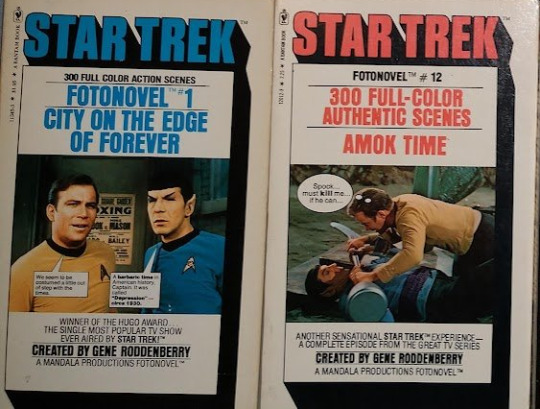

Some things cannot avoid being abridged or compressed in favor of this new format but for the most part this is never really distracting and nor does it take away from the reading experience. After all, it's supposed to be a very detailed reminder of the episode you already know, so you can just relive it with the pictures.
Additionally, sometimes the fotonovels have extra lines and these are mostly found in the way of thought bubbles the characters have. Overall they're very charming but don't have a lot of utility now a days. I own some because I have problems.... They make up almost a fourth of my ST TOS book collection.
If you are interested in them my general thoughts are that the ones made from the episodes are really well done for what they are. They're also basically just some of the most popular episodes from the show using only episodes from the first two seasons. They're delivered in their own order adhering to neither the release of the show nor its intended release.
TITLES (ones i own)
The City on the Edge of Forever
Where No Man Has Gone Before
The Trouble With Tribbles
A Taste of Armageddon
Metamorphosis
All Our Yesterdays
The Galileo Seven
A piece of the Action
The Devil in the Dark
Day of the Dove
The Deadly Years
Amok Time
Star Trek: The Motion Picture Photostory
Star Trek II: The Wrath of Khan Photostory
Now, you'll notice I said that the ones made for the episodes are good, and so far I have been sure to separate the ones done for the movies. This is because there's a bit of a quality drop.
For starters, they kept them the same length as the fotonovels of the episodes. Right away that presents a pretty big quandary because the movies are over twice as long. So if you're looking for something that adds to the experience of seeing the movies, these last two fotonovels will not do that- rather they will take away. A lot of scenes just don't make it into them and neither of them are adding from the novelizations either.
And then we have their page quality. All but one of these have shiny, coloured pages. Wrath of Khan is unfortunately in black and white and not even composed like a comic but is rather movie stills with accompanying dialogue. That's sort of like a massive let down given how big of a deal that movie is.
I intend to really get into the nitty gritty with each of these- especially the movie adaptions.
And, if you're worried about the loss of homoerotic subtext- you're all good... plus its just a tad funnier this way.


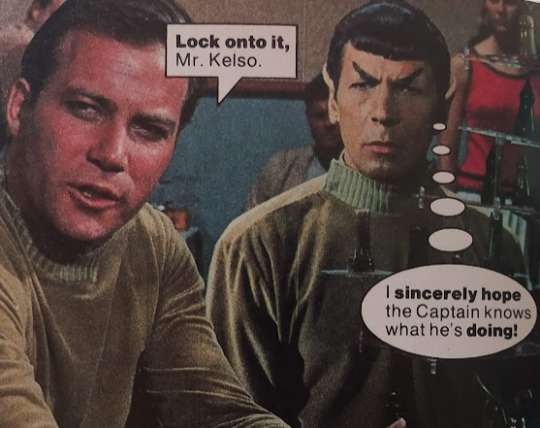
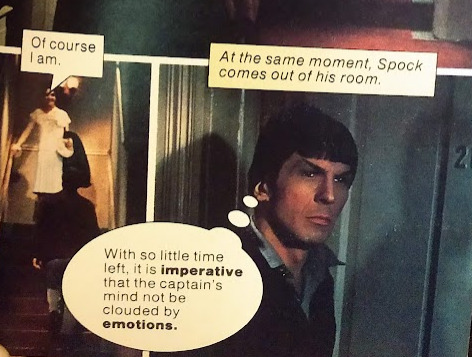

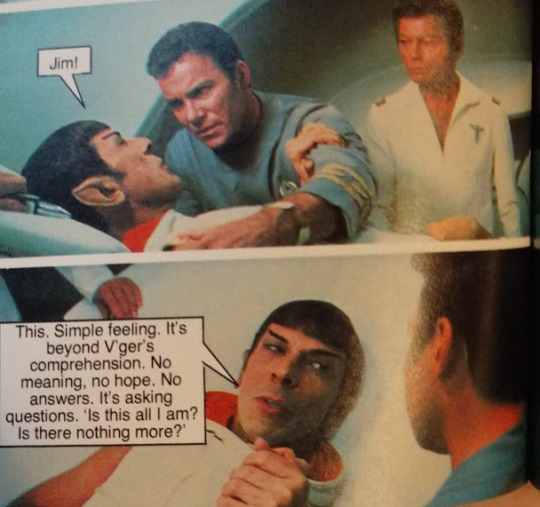
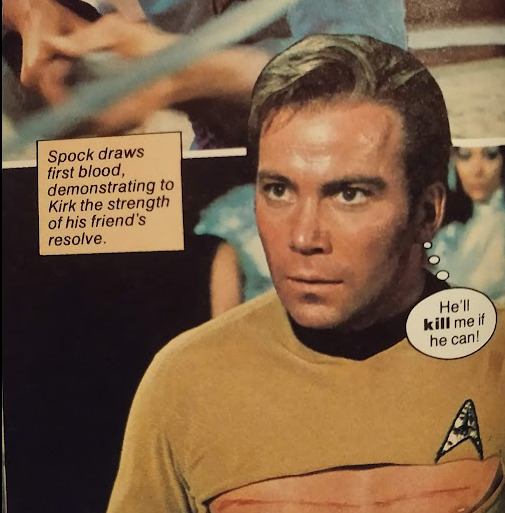
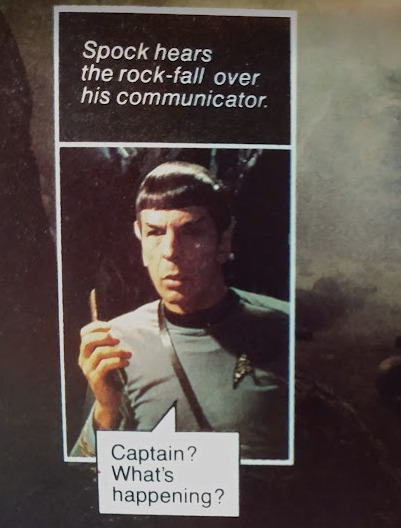
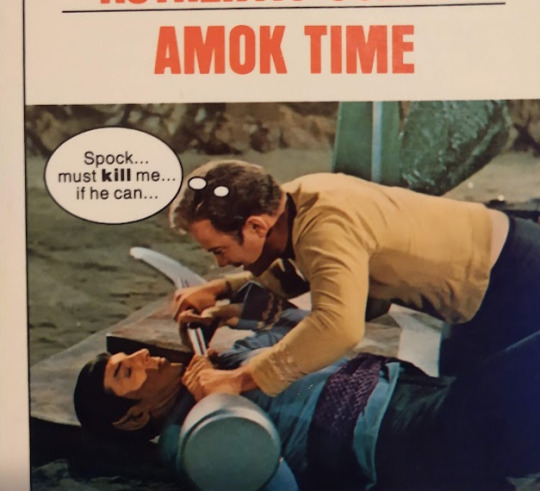
#“He's not only the best but the most amazing First Officer in the fleet.”#star trek#star trek tos#star trek tos fotostory#star trek fotostory#amok time#star trek the original series#the devil in the dark#city on the edge of forever#spirk#spock#kirk#star trek the motion picture
99 notes
·
View notes
Text
Percy Jackson Analysis ep.1
(did that sound vaguely pretentious? I feel like a need a funny name for this)
SO SORRY it took me this long. To be truthful I put on My Happy Marriage to listen to while refining my notes, I'm not a huge romance lover so I didn't think I would get that invested but then I proceeded to binge the whole thing...
anyways go watch My Happy Marriage, it messed me up in the best ways
On to my children, the way I wrote these notes was chronological, including lines I thought were powerful and thoughts I had while watching, enjoy my sub-tier analysis
To start with I think the casting, as well as most of the acting in the show, is phenomenal. There are some acting scenes which aren't great, but the nice things about child actors is that they grow and improve
iconic opening line 10000000/10
blackjack cameo? *chefs kiss*
One thing that really stands out to me regarding young Percy in school is that the bullying is portrayed so well. Like, sure some kids get punched but more often it's whispers, snide comments, teachers not doing enough to stop it. Not to mention when you have mental health problems or neurodivergency on top of that it makes it even harder to fit in and gain help from authority figures. There's no way teachers weren't aware of how Percy was being treated (we even see this in the books with mortals that don't care about him getting picked on by other mortals, think sea of monsters)
GROVER!!! I know I already ranted about the casting but Aryan just does such a good job. I hope in later seasons we see him more than we did in the books.
I'm UNHEALTHILY OBSESSED at the idea that mythomagic cards are to help train halfbloods. It also gets me thinking about season 3 interactions between little Nico and Percy. But it's incredibly clever to have a game that would entice children to learn more about the monsters they're likely to face against. It's also a clever marketing move irl.
Once again great portrayal of bullying while still keeping the show appropriate for kids
UNREALISTIC their paper would never be printed with color ink /lh
I really enjoy how they displayed dyslexia, it seems very accurate to descriptions.
"how it makes you feeeeel"
The lines about not everyone who looks like a hero being a hero and not everyone who looks like a monster being a monster is some of the best foreshadowing I've ever seen. It perfectly foreshadows Luke, Medusa, and generally captures one of the major points of Uncle Ricks books.
the hold fast line being used through the series *chefs kiss*
One thing I stand by in both the books and series is that I was incredibly disappointed in how little Chiron directly stood up for Percy- even in regards to mortals. Like yeah ok he's gonna be a hero but he's also twelve, help the poor boy!
The bullying Dodds shows Percy is also very accurate to real life. I've had many teachers who straight up bully kids just like this and are never called out for it.
The utilization of the word 'Special' thought the series is a great example of how "PoLite EUpHEmiSm' and often weaponized and used as derogatory terms and serves as an example of why many push for using terms like disabled over differently abled.
"childhood trauma, feelings of inadequacy" DAMN GROVER just going for the jugular, pop off. love how the show incorporates realistic convos kids would have. This instance and other little side bars we see throughout the show add something that I often find missing in television throughout all generas. it's incredibly important to have realistic convos to help solidify characters as people.
"Never ever stand up to them" "that doesn't sound right" THIS LINE 10000000/10
"there you are" we're not fools Percy Jackson
I did feel like this should have been Perseus Jackson seeing as how it's pretty canonical that monsters and gods alike only refer to him using his full name, adding on the the names have power theme that permeates throughout the series.
trauma for days
"is he dead?"
Chiron low-key being the embodiment of gaslighting, girl boss, gatekeep
UNCLE RICK CAMEO!!!
realist portrayal of adults already having their mind made up and children being unable to do anything except tell their story over and over
(also does Kronos speak to Percy in his dreams as the school principal? I genuinely can't remember, if so Kronos sure knows how to embody nightmares)
I honestly wish they would have expanded more on both how guilty grover would have felt rating Percy out (even if it means protecting him) and also how betrayed Percy would have felt. his fatal flaw is loyalty, grover was his very first and very best friend, he only really has his mother, this would have been a huge punch in the gut.
anyone else feel like grover and Percy should have been interviewed separately?
I'm sorry, I have to complain about the lighting in this show. WHY IS IT SO DARK? THIS ISNT SHOWN IN THEATERS! MY EYES ARENT THIS GOOD. IM SQUINTING TRYING TO FIND OUT WHAT IS ON THE TV!! WHYYYYY??!?!
"at least I know you think you didnt" -not helpful Chiron :/ shame on you
"you might have the most difficult journey" great foreshadowing
'SPeCiaL'
I know there was lots of discussion about how Gabe wasn't abusive 'enough' but often times abuse isn't easy to see or what TV leads you to believe. The show keeps it age appropriate while also showing how much of a leech and how controlling he is (answering Sally's phone, not wanting her to leave to the beach). Honestly I might make a separate post on this but at the moment I'm tired of seeing ignorant people claim that Gabe wasn't aggressive enough or that Sally wasn't meek enough to be abused.
I was disappointed that Eddie became a 'good' character instead of showing how abusive adults often have buddies backing them up
It's realistic Percy would talk to Gabe even though he's a dick, kids want to make connections
Sally in the rain- reference to Poseidon 10/10
Sally is just happy to see him :')
"all that matters is that your here, ok?" aww
BLUE FOOD!!!
"Is there something else you wanna talk about" mom knows
"I'm scared" damn does that resonate
once more just because Sally isn't portrayed as meek doesn't mean that that whole interaction wasn't unhealthy and abusive
di angelo reference! even if it's not our di angelo the name choice was incredibly purposeful
"it's getting angrier" personification of the storm lends well to Zeus and Poseidon
love PJO dream sequences
"who are you" does Kronos not know who Percy is? Gonna be real this confuses me, am I missing something obvious?
Sally was crying??!?!
the race from the car to the cabin is another example of the writers (and actors) creating realistic people you can connect to. the nostalgia that hit me in this scene was POTENT
It's so so so important to have a place to escape to as an abuse victim, and as a teen in general. Scratch that, just people in general need places to escape to which makes the cabin even more significant
Percy's self deprecating marshmallow talk :(
"I'm used to the world feeling weird to me" neurodivergency and mental health issues can create very isolating atmospheres making community important -camp is that community
Uncle Rick does a great job creating metaphores regarding discrimination and ableism
It's so hard to tell someone you trust and love that you think something is wrong, especially as a child. Walker did a fantastic job capturing all the mixed up emotions that occur.
"something that felt real to you but no one else could see" once again significant to neurodivergency and mental health
I don't personally like the choice to have Sally tell Percy that his father is a god. The acting in the scene also just rubs me really wrong - it feels fake. I think I enjoyed the book version better with him never receiving a clear answer until camp, and even then you can debate on how "clear" it was.
I would be freaking out so much more that Walker if my mom approached the subject like this. It would be incredibly frightening to think your mom was going insane alongside you.
"there is something wrong with my brain" once again, uncle Rick reaches out of the screen/pages to hit me where it hurts
"I don't want to see him" the betrayal he feels :(
grover pants scene (I feel no need to elaborate on this note, it was by far the funniest scene of the episode 1000000000+
"so the important thing is not to panic"
"who are you" nooo he's ur friend don't do this to me :(((
I love grover
very nice natural lead into explaining the mist
The show is unfortunately hit with the complex issue of trying to provide context to an audience who already knows and is eager to see the action. I know there were many criticisms about it but I will say my mother, who didn't read the books, felt she had a firm grasp on the lore of the show, so that counts for something?
"what else haven't we talked about, what else haven't you told me" broken trust :(((
"I'm actually 24" NOW IS NOT THE TIME GROVER
"won't all of us be safe" ha... about that
"swear it, SWEAR IT GROVER" damn, okay sally
again, WHY IS THE LIGHTING SO DARK?!?! I know it helps hide cgi but we know there's gonna be CGI in a show abt monsters and myths
"you are not broken, you are singular" amazing foreshadowing
Sally is bamf
trauma
the choice to make things silent after Sally 'dies' *chefs kiss once again
I just really love the shot of Percy surfing down the monster dust
"he must be the one" :)))
hope y'all enjoyed :)
#annabeth chase#annabeth pjo#disney plus#disney+#grover pjo#grover underwood#percy jackon and the olympians#percy jackson#percy pjo#disney#pjo season 1#pjo tv show#pjo series#pjo#pjo spoilers#pjo show
23 notes
·
View notes